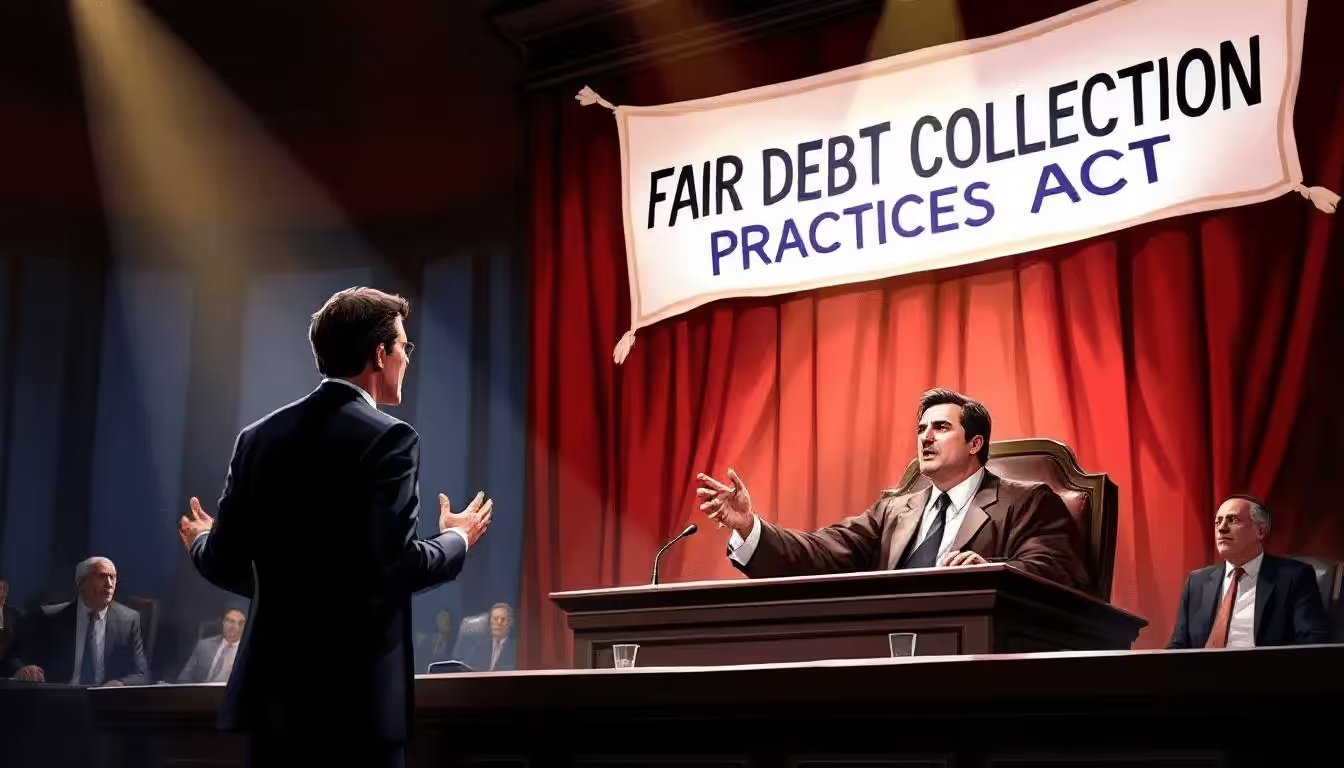Can You Sue Debt Collectors For Harassment❓
Yes, you can sue debt collectors if they violate your rights under the Fair Debt Collection Practices Act (FDCPA). This article will guide you through your rights, the legal protections available, and the steps you need to take to answer the question: can you sue debt collectors and hold abusive debt collectors accountable.
Key Takeaways
- ➡️ Consumers have the right to sue debt collectors for violations of the Fair Debt Collection Practices Act (FDCPA), which protects against abusive and deceptive debt collection practices.
- ➡️ Documentation of communications and actions by debt collectors is critical before initiating a lawsuit, as it serves as evidence of any illegal activities.
- ➡️ Alternatives to suing, such as filing complaints with regulatory agencies or sending cease-and-desist letters, can effectively address FDCPA violations without the need for legal action.
Understanding Your Right to Sue Debt Collectors
As a consumer, you have the right to sue debt collectors who violate the law. The Fair Debt Collection Practices Act (FDCPA) provides this protection, ensuring that you can take legal action against unfair debt collection practices and debt collection laws. Whether the collector employs abusive, deceptive, or unfair behavior, you are entitled to seek justice.
However, time is of the essence. You must act within one year from the date the violation occurred. This statute of limitations is critical; waiting too long can forfeit your right to take legal action. While you can sue for violations under state law, this does not eliminate the debt itself. The debt remains valid, and you are still responsible for it, even if the debt collector has broken the law.
Understanding these nuances is the first step. Recognizing that there are legal frameworks, including state laws, to protect you from abusive collection tactics can be empowering. It sets the stage for the more detailed discussions that follow about the FDCPA and the specific steps you can take if you decide to sue.
What Is the Fair Debt Collection Practices Act (FDCPA)❓

The Fair Debt Collection Practices Act (FDCPA) is the cornerstone of consumer protection against abusive debt collection practices under federal law. Enacted to provide clarity and fairness, the FDCPA governs the actions of third-party debt collectors, including collection agencies, lawyers who regularly collect debts, government agency companies that buy delinquent debts.
Under the FDCPA, debt collectors are prohibited from engaging in abusive, deceptive, or unfair practices. For example, they cannot use threats of violence, misrepresent their identity, or demand payment of amounts not legally authorized. The law also limits the times during which debt collectors can contact you, specifically barring contact before 8 a.m. and after 9 p.m. unless you agree otherwise.
The FDCPA protects you from overly aggressive actions and ensures that any contact made by debt collectors is fair and respectful. While the FDCPA applies only to third-party debt collectors and not original creditors, its provisions are crucial for maintaining ethical standards in debt collection and providing recourse when those standards are breached.
Identifying Violations: When a Debt Collector Breaks the Law
Recognizing when a debt collector violated the law is key to protecting your rights. The FDCPA outlines several specific actions that constitute violations. For instance, debt collectors are prohibited from using harassment or intimidation tactics, which include obscene or profane language, repeatedly calling intended to annoy, and threats of arrest. If a debt collector violates the FDCPA, you have the right to take action.
Another critical aspect of the FDCPA is the prohibition of deceptive practices and misleading practices. Debt collectors must:
- ▶️ Be transparent about their identity and the nature of the debt.
- ▶️ Not lie about the amount owed.
- ▶️ Not falsely claim that legal action will be taken against you.
- ▶️ Cease direct communication with you if you have an attorney representing you and contact your attorney instead.
Timing and location of debt collector contact are also regulated. Debt collectors cannot contact you at inconvenient times or places, such as your workplace, if you have informed them that such contacts are not allowed. Understanding these violations helps in identifying when a debt collector crosses the line, thus enabling you to take appropriate legal action regarding phone calls and further contact.
Steps to Take Before Suing a Debt Collector
Before you decide to sue a debt collector, preparation is essential. Start by documenting all interactions meticulously, including the initial communication. Record calls, dates, times, and the content of every communication. Keep a record of written communications, emails, and letters.
This documentation serves as evidence of any violations.
Sending a cease-and-desist letter can also be a powerful step. By law, debt collectors must stop contacting you once they receive this written notice. Use certified mail to ensure you have proof of delivery. Additionally, you can file complaints with regulatory agencies such as the Federal Trade Commission (FTC) or the (CFPB) to report illegal actions.
These steps not only build a strong case but also often lead to immediate relief from harassment. Proper documentation and official complaints lay the groundwork for a successful legal challenge if you decide to sue a debt collector.
Filing a Lawsuit Against a Debt Collector

When you’re ready to take legal action, the process begins with:
- ➢ Filing a lawsuit in state or federal court.
- ➢ Drafting a detailed complaint, where you outline the specific FDCPA violations committed by the debt collector.
- ➢ Proper service of the lawsuit to inform the debt collector about the proceedings.
Once served, the debt collector has a limited timeframe to respond. If you win the lawsuit, you may recover actual damages and up to $1,000 in statutory damages, plus attorney’s fees and court costs. However, winning does not erase the original debt. The aim is to address the unfair practices, not to eliminate the debt itself.
Filing a lawsuit can be a powerful way to hold debt collectors accountable, but it’s essential to be well-prepared and understand both the process and potential outcomes.
Potential Outcomes of Suing a Debt Collector

Suing a debt collector can result in various outcomes. If you win, you may receive actual damages for any financial loss or emotional distress caused by the debt collector’s actions. Even if you cannot prove actual harm, the judge may still award you up to $1,000 in statutory damages.
In class action lawsuits under FDCPA:
- ➤ Damages are capped at $500,000 or 1% of the debt collector’s net worth, whichever is lower.
- ➤ You can recover damages, but punitive damages are not available.
- ➤ Winning the fdcpa lawsuits does not erase the original debt you owe.
Debt collectors may also defend themselves, potentially reducing their liability. Understanding these potential outcomes helps set realistic expectations when embarking on a legal challenge against unfair debt collection practices.
Alternatives to Suing: Other Ways to Address FDCPA Violations
Suing a debt collector is not the only way to address FDCPA violations. Filing consumer complaints with the FTC or CFPB can lead to investigations and potential penalties for the debt collector. These agencies handle consumer protection and can provide assistance in resolving disputes.
Sending a cease-and-desist letter is another effective method to stop harassment. Additionally, evidence of FDCPA violations can be powerful leverage in negotiating settlements with debt collectors. In some cases, simply highlighting the violations can lead to more favorable repayment terms or reduced debt amounts.
These alternatives provide options for addressing violations without the need for a lawsuit, offering quicker and less adversarial solutions to debt collection issues.
The Role of a Lawyer in Debt Collection Lawsuits

Consulting a lawyer can significantly enhance your chances of success in a debt collection lawsuit. A consumer protection attorney can help navigate the complexities of the legal process, ensuring your rights are protected. Debt collection lawyers are skilled negotiators who can work towards reducing debt amounts or creating feasible repayment plans.
Moreover, lawyers act as a buffer between you and the debt collectors, alleviating the stress of constant collection attempts. Many lawyers work on a contingency fee basis, meaning they get paid only if you win the case. While it’s not mandatory to hire a lawyer to sue a debt collector, having one can simplify the process and improve your chances of a favorable outcome.
In cases of unresolved disputes, a lawyer’s representation in court can make a significant difference, ensuring that the debt collector is held accountable for any violations.
Summary
Understanding your rights under the FDCPA is crucial in protecting yourself from abusive debt collection practices. Whether you choose to sue a debt collector or explore alternative solutions, knowing the law and your options empowers you to take control of your financial situation.
Remember, being informed is your best defense against unfair debt collection practices. By documenting violations, filing complaints, and potentially seeking legal action, you can hold debt collectors accountable and ensure fair treatment.
Consumer Rights Law Firm PLLC
Consumer Rights Law Firm PLLC is a law firm that specializes in helping clients who are facing harassment from debt collectors in any form, including telephone communication. Rather than suffer alone, contact our office to begin the process to stop debt collectors from harassment. Our office has been assisting consumers since 2010. We have an A+ rating with the Better Business Bureau.
If you are interested in learning more about how to safeguard yourself and prevent harassment from debt collectors. call us at 877-700-5790 for immediate assistance or visit our website.
FAQs
Can you sue a debt collector for harassment?
Yes. Under the Fair Debt Collection Practices Act, you can file a lawsuit if a debt collector harasses you through repeated calls, threats, profanity, or by calling outside legally allowed hours. You may recover statutory and actual damages.
What constitutes harassment by a debt collector?
Harassment includes threats of violence or arrest, obscene or abusive language, publishing lists of people who allegedly refuse to pay, repeated calls meant to annoy, or using misleading identities to pressure you.
How do I know if a debt collector crossed the legal line?
A collector may have violated the law if they call before 8 a.m. or after 9 p.m., use threatening or profane language, contact you at work after being told not to, or refuse to identify themselves as a debt collector.
What damages can I recover if I sue?
You may recover up to $1,000 in statutory damages per lawsuit, plus actual damages such as emotional distress or lost wages. Attorney’s fees and court costs are also recoverable.
How long do I have to sue a debt collector under the FDCPA?
You generally have one year from the date the violation occurred to file a lawsuit. The deadline starts on the date of the misconduct, not when you discovered it.
Can I file a lawsuit on my own or do I need a lawyer?
You can file an FDCPA lawsuit on your own, but many consumers choose to hire a lawyer. Many attorneys take these cases on contingency, meaning no upfront fees.
What evidence do I need to sue for harassment?
Call logs, voicemails, recordings where legally allowed, letters, emails, and screenshots of messages are all useful evidence to prove harassment.
Can I get compensation if I didn’t experience emotional harm?
Yes. The FDCPA allows statutory damages even if you cannot prove emotional distress, as long as a violation occurred.
What happens if the court rules the violation was a bona fide error?
If the debt collector proves the violation was unintentional and occurred despite reasonable compliance procedures, they may avoid liability.
Can a state attorney general or federal agency sue debt collectors for harassment?
Yes. Government agencies such as the FTC, CFPB, and state attorneys general can take enforcement action against debt collectors who violate harassment laws.







